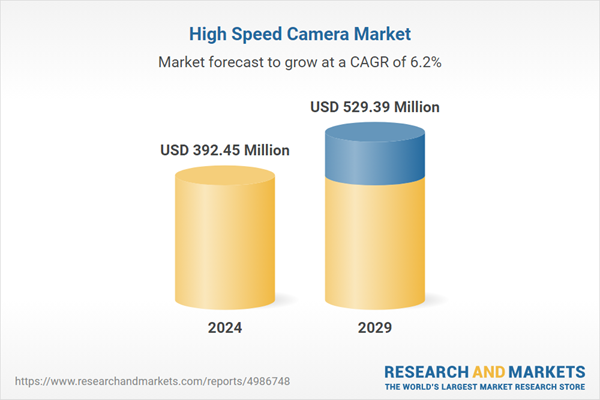High-speed cameras are imaging tools used to take photos of quick-changing events. They have high-speed cameras, which are tools for capturing images and creating images of fast-moving objects. It can examine objects not visible to the human eye when performing a task. Advanced photography plays an instrumental role in mechanisms research, ballistics, medicine, and biomedical research. Reliant on meticulous high-speed photography are industries that include biomechanics and ballistics as well as healthcare, entertainment, aerospace, automotive, and military. High-speed cameras are in excellent demand in the R&D, media & entertainment, and automotive industries because they can catch extremely fast events due to their high image processing and wide light sensitivity range. In addition, it is projected that the market for high-speed cameras will expand due to an increase in sensor suppliers and technical advancements.
High-Speed Camera Market Drivers:
Rising Adoption by Various Industries driving the High-speed Camera Market growth
The demand for high-speed cameras is increasing throughout industries due to their superior features to other cameras. The manufacturing industry's demand for high-speed cameras is anticipated to rise as a result of the growing demand for extremely thorough analyses, such as combustion testing and flow visualization in aviation, explosives, pyrotechnics, and ballistics. Due to their improved capabilities, such as high resolution, frame rate, and image processing, high-speed cameras are also in higher demand within the sports industry. These cameras have another use known as automatic incident detection that ensures immediate responses to car crashes or other forms of interruptions, particularly in risky places such as tunnels or bridges. This is attributed to various components, which include elevation in the employment of high-speed cameras in automotive and transport sectors, rapid growth in thermal imaging uses, the development of autonomous driving and intelligent transportation systems, and the relentless increase in defense R&D spending.Rising use of intelligent transportation system
The Intelligent Transport System (ITS) minimizes traffic issues to improve comfort and safety in an effort to maximize traffic efficiency. By providing users with up-to-date traffic, local convenience, real-time running information, seat availability, and other information, it shortens commutes and improves safety and comfort. Increasing use of cameras, particularly high-performance machine vision systems, as the main data sources in intelligent traffic systems. High-performing cameras such as fast ones with auto iris, day/night modes, wide sensors, and real-time features assist in maintaining traffic flow, minimizing negative environmental consequences of the transport sector to society and avoiding prospective accidents.High-Speed Camera Market Restraint:
High cost & limited application
The high price of these cameras is one of the main barriers to the high-speed camera market. Because of their sophisticated features and technology, high-speed cameras are costly to produce and buy. This makes it difficult for small and medium-sized businesses to afford them, thereby limiting their market potential.Further, Researchers and analysts mainly use high-speed cameras in the automotive, aerospace, and entertainment sectors. Processes that involve high-speed camera applications are mainly carried out in the automobile and aeronautic industries, aside from the entertainment division, to conduct research and analysis. This restricts their customer base and applications, which slows the market growth.
High-Speed Camera Market Geographical Outlook
Asia Pacific is projected to grow rapidly during the forecast period
The Asia-Pacific region is anticipated to expand during the projection period at a significant rate. This growth is expected to be largely driven by the emergence of manufacturing hubs, particularly in China and India, coupled with rapid industrialization. Increased global investment in manufacturing around the area has also led to the rise in demand for better production line monitoring systems. These include the automotive, consumer electronics, food and beverage, and healthcare industries, which are all experiencing increased demands in their respective products. Robotics and computer vision capabilities are anticipated to be used more frequently by the industrial and automotive sectors in China, India, and Japan, which will support regional growth.High-Speed Camera Market Developments:
- In November 2023, two new high-speed cameras, the Chronos 4K12 and the Chronos Q12, were released by Kron Technologies Inc. They are reasonably priced in comparison to other cameras in their category.
- In May 2023, the TNO-7180RLP high-speed ANPR camera with 3MP Global Shutter technology was introduced by global vision solutions provider Hanwha Vision to detect number plates on vehicles traveling at up to 200 km/h (125 mph) across two lanes of traffic. The camera is equipped with Hanwha's recently released ROAD AI solution, which employs AI video analytics to determine the make, model, color, and type of detected vehicles.
Key Market Segmentation:
The High-speed camera Market is segmented and analyzed as below:
By Component
- Hardware
- Image Sensors
- Memory Systems
- Lenses
- Image Processors
- Battery
- Others
- Software
By Resolution
- 1 to 4 Megapixel
- More than 4 Megapixel
By End-User Industry
- Travel and Transport
- Media and Entertainment
- Consumer Electronics
- Military and Defense
- Others
By Geography
- North America
- USA
- Canada
- Mexico
- South America
- Brazil
- Argentina
- Others
- Europe
- Germany
- France
- United Kingdom
- Italy
- Others
- Middle East and Africa
- Saudi Arabia
- UAE
- Others
- Asia Pacific
- India
- China
- Japan
- South Korea
- Taiwan
- Thailand
- Indonesia
- Others
Table of Contents
Companies Mentioned
- AOS Technologies AG
- AMETEK (Vision Research Inc.)
- IMAGICA Corp (Photron)
- DEL Imaging Systems LLC
- NAC Image Technology
- iX Camera
- WEISSCAM GMBH I.L
- Excelitas Technologies (PCO GmbH)
- RDI Technologies (Fastec Imaging)
- SVK-Vistek GmbH
Table Information
| Report Attribute | Details |
|---|---|
| No. of Pages | 142 |
| Published | June 2024 |
| Forecast Period | 2024 - 2029 |
| Estimated Market Value ( USD | $ 392.45 Million |
| Forecasted Market Value ( USD | $ 529.39 Million |
| Compound Annual Growth Rate | 6.1% |
| Regions Covered | Global |
| No. of Companies Mentioned | 10 |









